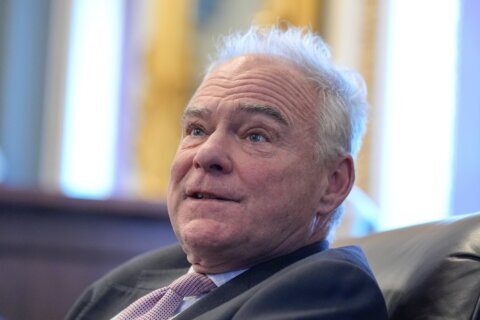
A group of Republican U.S. senators vowed to fight a D.C. statehood bill recently passed by the House and urged the GOP leadership on Wednesday to allow for a floor vote, where they believed it would be soundly rejected.
Sen. Lindsey Graham, R-S.C., the chairman of the Senate Judiciary Committee, called the statehood bill unconstitutional and a “power grab,” aimed at getting Democrats two senators and another voting member of the House.
“It would empower the most radical agenda in modern American politics,” Graham said at a U.S. Capitol news conference, where he appeared with Republican Sens. Steve Daines of Montana and Tom Cotton of Arkansas.
Graham and the other Republican lawmakers gave no details as to how the bill violates the Constitution, and Democrats have rejected such suggestions.
Graham criticized Democrats on a variety of fronts, and downplayed the fact that D.C. statehood advocates are seeking representation in Congress as taxpayers.
“This is a continuation of the efforts by the Democrats to alter the way America operates, from packing the (U.S. Supreme) Court, to doing away with the legislative filibuster. I can go on and on and on about the desire to reshape the political balance in this country,” he said.
The Senate is currently controlled by Republicans, but Democrats would gain control this November if they pick up four seats, or three seats and the presidency.
Graham wants Senate Majority Leader Mitch McConnell to allow for a vote, which would follow the House’s approval of the bill last Friday.
“All of us need to be on the record,” he said. “I think it’s a bad deal for the country, and it’s driven by power.”
McConnell has been dismissive of the statehood legislation and not given any indication of whether he’ll reconsider taking up the bill.
Cotton said that “Washington, D.C., is a city — it’s not a state,” and he said it should remain that way.
The Republican lawmaker has been critical of the sporadic violence during weeks of protests in the wake of the death of George Floyd, who died in Minneapolis police custody.
Though most of the protests in D.C. have been peaceful, Cotton cited the looting and rioting that took place soon after Floyd’s death as another argument against the District becoming a state.
“What did it take to stop that rioting? The D.C. National Guard, which is under the control of the Department of Defense and federal law enforcement agencies,” Cotton said. “That’s why we have a federal city — to ensure the safety, the security and the continuity of operations of our federal institutions.”
D.C. Mayor Muriel Bowser and D.C. Del. Eleanor Holmes Norton have been sharply critical of the Trump administration’s use of force to clear out protesters from Lafayette Square, as well as the deployment of National Guard personnel, who were not requested.
House hearings were held this week to review the use of force against protesters.
Democrats have proposed stripping the president’s power to call in the D.C. National Guard and leaving it to the District’s mayor to make that decision. The legislation was originally introduced by Norton in the House and has now been introduced in the Senate.
Graham’s news conference was held a few hours ahead of a virtual hearing on D.C. statehood held by the Senate Democratic Policy and Communications Committee.
Several Democratic senators took part in the hearing, including Senate Minority Leader Chuck Schumer.
Schumer called some of the comments made at the GOP news conference “despicable.”
He singled out a statement made by Daines, who said that he felt that it was important for lawmakers to get out of Washington, “to where the real people are at.”
“This is a dehumanizing statement about 700,000 hard-working people in the District of Columbia, plain and simple,” Schumer said.
Norton said she is working to build support in the Senate for her legislation, which is sponsored in the upper chamber by Sen. Tom Carper, a Democrat from Delaware.
Maryland Sens. Chris Van Hollen and Ben Cardin, and Virginia Sens. Mark Warner and Tim Kaine, are among those who support the legislation.
President Donald Trump has said he would veto D.C. statehood legislation in the unlikely event that it reaches his desk.








